Kathleen Jones's Blog, page 73
January 23, 2012
Tuesday Poem: More stones from the river
It's been such a busy week my small stones are just observations scribbled in my notebook that haven't yet made it into poems or prose. A summary of my week in a few images. Who knows where they might go?
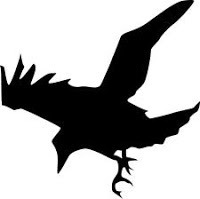 A crow falling away from the wind, like a black rag.
A crow falling away from the wind, like a black rag.
The car waltzes on/water, powered by the wind./A pivotal movement.
What do you do when the switch inside your head decides it's morning, in the middle of the night?
In the pub, watching the fire-light through a glass of wine. A good place to be on a cold evening.
For lots of good Tuesday Poems please visit the Tuesday Poets website at www.tuesdaypoem.blogspot.com
For more Small Stones in the River of Stones check out www.writingourwayhome.com

 A crow falling away from the wind, like a black rag.
A crow falling away from the wind, like a black rag.The car waltzes on/water, powered by the wind./A pivotal movement.
What do you do when the switch inside your head decides it's morning, in the middle of the night?
In the pub, watching the fire-light through a glass of wine. A good place to be on a cold evening.
For lots of good Tuesday Poems please visit the Tuesday Poets website at www.tuesdaypoem.blogspot.com
For more Small Stones in the River of Stones check out www.writingourwayhome.com
Published on January 23, 2012 09:38
January 22, 2012
Interviewing for a book
One of the reasons that I'm back in Britain is to meet and interview several people for a possible new biography. The subject of the book (can't reveal the name yet!) lived through the 20th century, so there are many people alive who knew them, which is both a blessing and a difficulty.

When I wrote the Catherine Cookson biography many, many people wanted to talk to me and seemed desperate to give me information, but hardly anyone was willing to be quoted publicly because they feared a backlash. To a biographer, information you can't reference is virtually worthless. You have to be very careful of the libel laws in England, because they are much more stringent than anywhere else in the English speaking world. People's feelings matter too, even if the material you have is true. So I have to be very sensitive to those who are still alive and may be hurt by something I publish. That is always a big dilemma for the biographer.
I love talking to people and am always impressed by how kind they are and how generous with their time. This week I'm just having exploratory chats in order to establish the background, so that I know what information I'm going to have to ask for in further interviews. The most difficult interviewees are often people who work in the media, or are prominent in public life, who may ask you to submit questions in advance, which is difficult if you haven't met them before and don't know how close their relationship was with the subject, or what material they have in their possession. You simply don't know which questions you need to ask.
There are some ethical rules for interviewing - always ask if you can record the interview, if that's what you intend. Only once have I recorded secretly - a meeting with a very difficult individual who was denying information he'd already given me over the phone and was threatening to sue me if I quoted him. I feared he was going to misrepresent my own words in the tabloid press, so I recorded our conversation just in case. Recording is better than taking notes (though I take a few of those too, just in case there's a glitch) because you spend a lot of time writing rather than listening and it interrupts the flow.
I try always to let the interviewee have a summary of the interview afterwards, particularly the parts I want to quote from, so that they have the opportunity to draw back from publication, and to correct any errors that I might have made.
I do lots of homework beforehand - reading as much material as I can and trying to make sure I've got the relationships clear. I once interviewed someone who was a twin and got the twins' names the wrong way round. Very embarrassing and very unprofessional.
There's usually a list of questions in my notebook, but other questions come up in conversation and you have to be prepared for them - like ripples in a pond, you can go a very long way from the starting point!
So, a very interesting week and it's not over yet.


When I wrote the Catherine Cookson biography many, many people wanted to talk to me and seemed desperate to give me information, but hardly anyone was willing to be quoted publicly because they feared a backlash. To a biographer, information you can't reference is virtually worthless. You have to be very careful of the libel laws in England, because they are much more stringent than anywhere else in the English speaking world. People's feelings matter too, even if the material you have is true. So I have to be very sensitive to those who are still alive and may be hurt by something I publish. That is always a big dilemma for the biographer.
I love talking to people and am always impressed by how kind they are and how generous with their time. This week I'm just having exploratory chats in order to establish the background, so that I know what information I'm going to have to ask for in further interviews. The most difficult interviewees are often people who work in the media, or are prominent in public life, who may ask you to submit questions in advance, which is difficult if you haven't met them before and don't know how close their relationship was with the subject, or what material they have in their possession. You simply don't know which questions you need to ask.
There are some ethical rules for interviewing - always ask if you can record the interview, if that's what you intend. Only once have I recorded secretly - a meeting with a very difficult individual who was denying information he'd already given me over the phone and was threatening to sue me if I quoted him. I feared he was going to misrepresent my own words in the tabloid press, so I recorded our conversation just in case. Recording is better than taking notes (though I take a few of those too, just in case there's a glitch) because you spend a lot of time writing rather than listening and it interrupts the flow.
I try always to let the interviewee have a summary of the interview afterwards, particularly the parts I want to quote from, so that they have the opportunity to draw back from publication, and to correct any errors that I might have made.
I do lots of homework beforehand - reading as much material as I can and trying to make sure I've got the relationships clear. I once interviewed someone who was a twin and got the twins' names the wrong way round. Very embarrassing and very unprofessional.
There's usually a list of questions in my notebook, but other questions come up in conversation and you have to be prepared for them - like ripples in a pond, you can go a very long way from the starting point!
So, a very interesting week and it's not over yet.
Published on January 22, 2012 10:11
January 20, 2012
Two Katherines and grey weather
It's grey here in northern England at the moment. The air tastes of snow and there's what - in Scotland - they call "a lazy wind" - lazy because it goes straight through you instead of going round! The Mill is very damp, having been uninhabited for a while, and it takes a few days for the heating to get a grip on the thick stone walls.
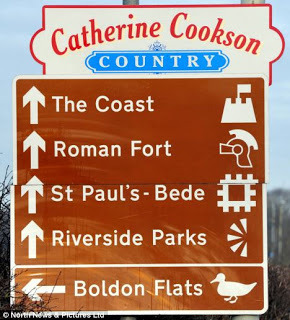
My trip back home is proving unexpectedly busy. Before I was even off the train I was being rung up by BBC producers wanting to talk about Catherine Cookson. Not having seen the UK newspapers for a while, I had no idea why and had to Google the subject. 'Catherine Cookson Country' is, apparently, to be abolished. The inhabitants are shocked and horrified. The novelist's sales have slumped since her death (inevitably), and she isn't the household name she once was, but the landscape Catherine Cookson wrote about and made famous is still associated with her, even though the tour buses don't come in their hundreds as they once did.
Apparently the tourist board in the north east have decided that 'Catherine Cookson Country' is not how they want to market the area at all, that it gives a negative image and they want to advertise their beaches instead. Catherine would have been furious with rejection. And it does seem to be a curious decision. The north east of England has some of the most beautiful beaches in Britain, but add in the Catherine Cookson connection and it definitely gives them an edge - beauty and books. Like the Bronte's Haworth and Du Maurier's Cornwall, Jarrow and South Shields will always be Catherine Cookson's country, even if they take the signs down.
So this morning I'm talking about CC on Radio 4, and then this afternoon I'm 'doing' the Wordsworth Trust's Arts and Books festival talking about Katherine Mansfield and the Dorothy Wordsworth connection. Let's hope I don't get the two C/Katherine's confused!

My trip back home is proving unexpectedly busy. Before I was even off the train I was being rung up by BBC producers wanting to talk about Catherine Cookson. Not having seen the UK newspapers for a while, I had no idea why and had to Google the subject. 'Catherine Cookson Country' is, apparently, to be abolished. The inhabitants are shocked and horrified. The novelist's sales have slumped since her death (inevitably), and she isn't the household name she once was, but the landscape Catherine Cookson wrote about and made famous is still associated with her, even though the tour buses don't come in their hundreds as they once did.
Apparently the tourist board in the north east have decided that 'Catherine Cookson Country' is not how they want to market the area at all, that it gives a negative image and they want to advertise their beaches instead. Catherine would have been furious with rejection. And it does seem to be a curious decision. The north east of England has some of the most beautiful beaches in Britain, but add in the Catherine Cookson connection and it definitely gives them an edge - beauty and books. Like the Bronte's Haworth and Du Maurier's Cornwall, Jarrow and South Shields will always be Catherine Cookson's country, even if they take the signs down.
So this morning I'm talking about CC on Radio 4, and then this afternoon I'm 'doing' the Wordsworth Trust's Arts and Books festival talking about Katherine Mansfield and the Dorothy Wordsworth connection. Let's hope I don't get the two C/Katherine's confused!
Published on January 20, 2012 03:41
January 19, 2012
Book Review - Not Saying Goodbye at Gate 21
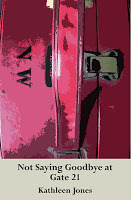 Lovely review from New Zealand poet and author Tim Jones, whose work (Men Briefly Explained) I admire, so it makes the review doubly valuable. Cheered me up on a grey morning. Thanks Tim! Review at 'Books in the Trees'
Lovely review from New Zealand poet and author Tim Jones, whose work (Men Briefly Explained) I admire, so it makes the review doubly valuable. Cheered me up on a grey morning. Thanks Tim! Review at 'Books in the Trees'
Published on January 19, 2012 00:12
January 18, 2012
The Most Depressing Day of the Year?
 This is what it looked like at London Bridge station last night
This is what it looked like at London Bridge station last nightBack to England yesterday. A weary journey. Two 'incidents' brought trains to a complete halt between Gatwick airport and Victoria station London, resulting in extreme congestion and delays on the remaining services. Forcing our way through crowds - like a riot, or sale day at Harrods, having station gates slammed in our faces because there were too many people on the concourse for safety. Then missing the main line train we could have got on because the doors were locked just as we reached the train (still 2 minutes to departure) Policemen patrolling the station in threes with AK47 assault rifles in their hands and other weapons slung about their persons, accompanied by sniffer dogs. This isn't an England I recognise, but fear I must get used to.
It took less than 2 hours on the plane from Pisa to Gatwick and another three and a half to get from Gatwick to London (normally 30 minutes) then another three to get out of London northwards. Hungry, tired, cheated of an evening with my children and grandchildren, I wasn't in too good a mood by the time I arrived in the midlands. But thinking about the suffering of the families of the two people who died after throwing themselves under high speed trains put it all into perspective. England isn't in great shape right now.
And maybe it had something to do with the fact that the third week in January is statistically supposed to be the most depressing week of the year, and Monday, 'Blue Monday', the most depressing day. Obviously Tuesday wasn't good either.
Published on January 18, 2012 13:43
January 16, 2012
Tuesday Poem: Kim Moore, The Drowned Fields
Although being without him now
would be like standing on one leg
still everything seems paper thin.
If my foot slips and breaks the surface,
I'll fall to a land of drowned fields,
where the only language is the language
of the sky and the birds make endless
patterns in the air and the pools of water
are words the rain has left behind.
The birds are like shadows in the corner
of my eye, or silver, as if the sky
is throwing money to the ground.
Next to the path the grass moves beneath
my feet. Hummocks store black water
while his thoughts, impossible to ignore
push their way across the land like large
enthusiastic dogs. The lives I could
have led are silver threads across
the drowning land and birds come
together , then spread apart, as if the sky
opened its hand and let them loose.
Kim Moore
Kim Moore (who just happens to live in Cumbria) is a young British poet who is regarded as one of the bright stars of the future. Kim has won two of the UK's most prestigious prizes for young poets - an Eric Gregory Award and the Geoffrey Dearmer Prize in 2011. She is 29 and works as a peripatetic music teacher, and is also in the final year of a part-time MA in Creative Writing at Manchester Metropolitan University. She has been published in the TLS, Poetry Review, The North, The Rialto and Ambit - all excellent places - and has read alongside Carol Ann Duffy at the Royal Exchange in Manchester.
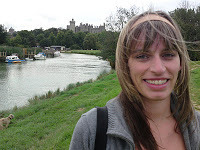
The title 'The Drowned Fields' resonates with the weather up here in the northern hemisphere at the moment. I like the way the poem starts in mid-conversation, with images of a fragile relationship - the thin crust we all walk on with the ones we love before our lives become inextricably meshed together. The repetition of the words 'drowned', 'drowning,' emphasises the feeling of being overwhelmed and adds to the sense of danger - committing yourself to a relationship is one of the most risky things we do.
I particularly like this image:
' his thoughts, impossible to ignore
push their way across the land like large
enthusiastic dogs.'
And the way she describes the birds flocking and re-forming in the air,
'.........as if the sky
opened its hand and let them loose.'
But somehow the birds, coming together and spreading apart, are another metaphor for the fragility of the relationship.
Kim Moore is one to watch.
For other Tuesday Poems please take a look at the Tuesday Poets' blog over at www.tuesdaypoem.blogspot.com
There's some great stuff!

would be like standing on one leg
still everything seems paper thin.
If my foot slips and breaks the surface,
I'll fall to a land of drowned fields,
where the only language is the language
of the sky and the birds make endless
patterns in the air and the pools of water
are words the rain has left behind.
The birds are like shadows in the corner
of my eye, or silver, as if the sky
is throwing money to the ground.
Next to the path the grass moves beneath
my feet. Hummocks store black water
while his thoughts, impossible to ignore
push their way across the land like large
enthusiastic dogs. The lives I could
have led are silver threads across
the drowning land and birds come
together , then spread apart, as if the sky
opened its hand and let them loose.
Kim Moore
Kim Moore (who just happens to live in Cumbria) is a young British poet who is regarded as one of the bright stars of the future. Kim has won two of the UK's most prestigious prizes for young poets - an Eric Gregory Award and the Geoffrey Dearmer Prize in 2011. She is 29 and works as a peripatetic music teacher, and is also in the final year of a part-time MA in Creative Writing at Manchester Metropolitan University. She has been published in the TLS, Poetry Review, The North, The Rialto and Ambit - all excellent places - and has read alongside Carol Ann Duffy at the Royal Exchange in Manchester.

The title 'The Drowned Fields' resonates with the weather up here in the northern hemisphere at the moment. I like the way the poem starts in mid-conversation, with images of a fragile relationship - the thin crust we all walk on with the ones we love before our lives become inextricably meshed together. The repetition of the words 'drowned', 'drowning,' emphasises the feeling of being overwhelmed and adds to the sense of danger - committing yourself to a relationship is one of the most risky things we do.
I particularly like this image:
' his thoughts, impossible to ignore
push their way across the land like large
enthusiastic dogs.'
And the way she describes the birds flocking and re-forming in the air,
'.........as if the sky
opened its hand and let them loose.'
But somehow the birds, coming together and spreading apart, are another metaphor for the fragility of the relationship.
Kim Moore is one to watch.
For other Tuesday Poems please take a look at the Tuesday Poets' blog over at www.tuesdaypoem.blogspot.com
There's some great stuff!
Published on January 16, 2012 12:17
January 14, 2012
A Love Affair with Words - The Etymologicon
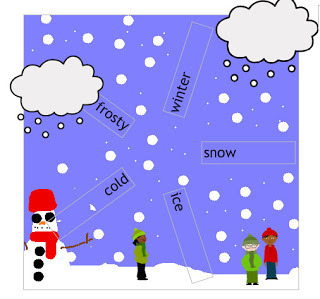
I've always loved words - can remember rolling them round and round in my head as a child, trying to work out what they meant. My parents, living in an isolated croft in the Cheviot hills, used to listen to the radio a lot, and I can remember lying in bed listening to the voices in the next room. One of my favourites was the weather forecast for shipping with its strange litany of place names, Shannon, Rockall, Malin, Dogger, Fisher, German Bight.
Words had personalities, and sometimes colours, of their own. Monday was always yellow, Tuesday blue, Wednesday green - I learned long words from the radio without any idea of what they meant. Meretricious was one - I thought it sounded like being deliciously rewarded for being good. Only when I grew up did I find out that it means 'befitting a prostitute'!
Being brought up in the North of England also means having a rich resource of Norse dialect to draw on - wonderful, strong words like pebbles in your mouth - 'thrang' meaning to be busy, 'lowp' meaning jump, and 'nithered' which meant shivering with cold, which we were - often. You didn't fix things, you 'fettled them up' and if you were feeling well you were 'in good fettle'.
The origin of words and how language changes over time is fascinating. English is such a hotch-potch of Anglo-saxon, Latin, French and other borrowed languages it often results in crazy connections - many of them logged in Mark Forsyth's hilarious scramble through the dictionary - The Etymologicon (currently only £1.99 on Kindle).
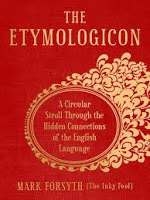
The connection between chickens and snooker? A French 'poule' (chicken) which becomes a 'pool' of money in the centre of a gaming(chickens again) table - hence anything held in common - a gene pool, a typing pool, a car pool, not to mention the game of pool, billiards and snooker - and back to French hens again.
Anyone guess the relationship between male body parts and the New and Old Testaments of the Bible, and to detest, protest and contest? Apparently you once (well, men anyway) used to have to use essential body parts to guarantee veracity. And Avocado is the Aztec word for the same thing, since the Aztecs thought the fruit were shaped like gonads - so they should really be called Aztec Balls.
So many words came originally from eating and sex and, of course in English, the weather. No surprise to anyone living in the north of the country that the word for Sky comes from the Viking word for Cloud, since they're often one and the same thing. Also no surprise that the word Dream comes from the Anglo Saxon for Happiness.
The expression 'letting the cat out of the bag' comes from a way of cheating someone who was trying to buy 'a pig in a poke'. And sometimes it was a dog that was substituted, which meant they were 'selling you a pup' instead of a pig.
I laughed a great deal when I read this book and it reminded me how much I love words, just for themselves.
Published on January 14, 2012 02:41



